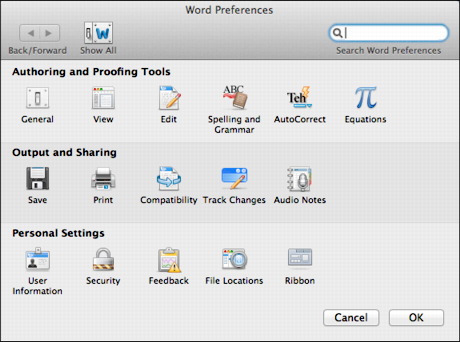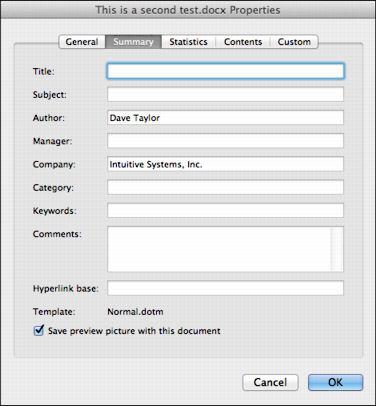
- MICROSOFT WORD FOR MAC ELIMINATES TRACK CHANGES AUTHOR INFORMATION WHEN SAVING HOW TO
- MICROSOFT WORD FOR MAC ELIMINATES TRACK CHANGES AUTHOR INFORMATION WHEN SAVING PROFESSIONAL
Try to learn something new every time you write something, which will likely be every day. This point is key: consider that every time you turn on your word processor is a learning opportunity.

In other words, you can turn the program on and immediately start typing, but there are myriad features and helpful tricks that you can be learning for years. I believe that word processing programs have a learning curve that starts low and gradually increases (moderate slope) over a moderate to long period.
MICROSOFT WORD FOR MAC ELIMINATES TRACK CHANGES AUTHOR INFORMATION WHEN SAVING HOW TO
Thus, knowing how to use it well and taking advantage of all its features will contribute to a positive ROTI. If you are a writer, then using a word processor in your day-to-day work will be the norm.

With that in mind, how do you prioritize what to learn and the hours to spend on that learning process? What will result in the best ROTI for you? Assuming that anyone reading this is either a nurse author or editor, I am going to make a few suggestions based on a job, position, or career where scholarly writing is an expectation. We are all busy people who don't have enough hours in the day to accomplish all we want to get done, but even so, we have lots of work to do. As Benjamin Franklin said, “Don't put off until tomorrow what you can do today.” This is always good advice! PRIORITIZING WHAT TO LEARN
MICROSOFT WORD FOR MAC ELIMINATES TRACK CHANGES AUTHOR INFORMATION WHEN SAVING PROFESSIONAL
While that might be true for a particular project, if you are in a position where professional writing is an expectation of your job, then you need to think beyond the “short article.” Likewise, even if you are in the middle of a big project, such as a dissertation, it is worth it to learn what you didn't learn at the beginning and make the fixes. Many people have said to me, “This is just a short article with only a few references, so I really don't need to learn how to…” (insert the thing they didn't learn to do). I believe people should use a long lens to consider hours saved. When you consider this as an ROTI issue, this may be money well spent. If you have a task that requires Ai level resources and expertize, it might be worth it to find someone who can help you-and you might need to pay for this service. Even if you need to create a simple figure for an article, or perhaps a flowchart, I would be hard pressed to say that learning Ai would pay off, even in the long run. Learning curve and time period for Paint and AiĬontinuing with this example, what do you need to do? If your project is to simply re-size a picture to post on a website or include in a manuscript, then you will probably never get a positive ROTI from spending hours learning Ai for this task. Do you need to fix 5 references, or 50? This becomes an ROTI issue. (Given that typewriters have not been commonly used for 30-plus years I am not sure where people are picking up these habits, but that's a different story for another day!) While it might be easy enough at the outset to create a reference list with tabs and spaces, fixing it after changes from a co-author or revisions requested by a journal is time consuming. I am regularly surprised-and dismayed-at how many people use their word processor like a typewriter-indenting paragraphs with the space bar (instead of using the tab key) or formatting references with spaces, tabs, and the enter key (instead of creating a hanging indent), to use two common examples. This offhand comment got me thinking about ROTI for nurse authors.Įvery manuscript I receive-whether for this publication, the other journal I edit ( CIN: Computers, Informatics, Nursing), or from another source-has been produced using a word processor, most commonly Word (Microsoft, Inc., Redmond, WA, USA). If you think of your time as money, then you might want to consider how long it takes you to learn or do something and if it will be worth it in terms of making a job more efficient, faster, or easier. I bring this up because recently a friend was musing on ROI which turned into “return on time investment” (ROTI).

Is that acceptable? I'll leave that decision up to the financial wizards who might be reading this to determine if they want to take that risk.

So, if I spent $1000 on something, and 1 year later it was worth $1200, then my ROI would be 20%.


 0 kommentar(er)
0 kommentar(er)
